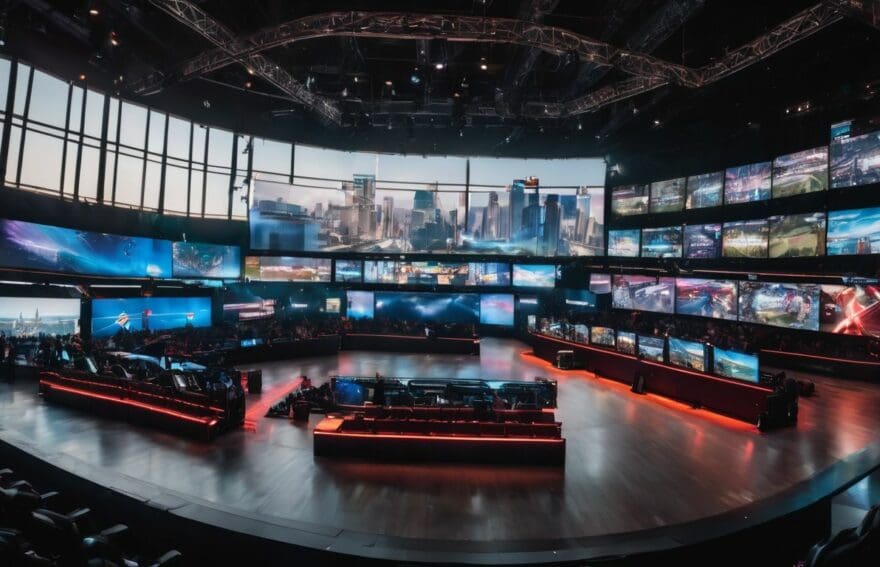The Impact of Covid-19 on Esports Teams and Leagues

Updated On: November 18, 2025 by James Connolly
The world of eSports took quite the turn when Covid-19 reared its unanticipated head. Just like everyone else, we’ve been navigating through a fog of uncertainty that has enveloped leagues and teams alike; yet against all odds, our collective enthusiasm for gaming surged with an impressive 70% uptick in viewership during these pandemic times.
This post offers a glimpse into how our virtual sportspeople have risen to the occasion—tinkering with strategies, poring over stats, and transporting their dynamic gameplay from raucous arenas to more intimate environments.
Do keep reading; this is a tale of tenacity and spirit that’s sure not to be missed.
The Covid-19 pandemic has led to a significant increase in viewership and participation in esports, as traditional sports events were cancelled or postponed, and people turned to online gaming for entertainment.
This has also resulted in a shift to online events and virtual competitions within the esports industry.
Increase in viewership and participation
Esports viewership skyrocketed during the pandemic as traditional sports leagues paused, casting a spotlight on virtual competitions. We tuned into streams and broadcasts in record numbers, eager for the thrill of competition while stuck at home.
Our own participation mirrored this trend – from casual gamers to aspiring pros, we all found more time to dive into online gaming worlds.
Organisations like ESL Gaming had to quickly adapt their strategies to capture our attention amid these shifts in our viewing and playing habits. Streaming platforms became arenas where professional gamers showcased their skills, with many of us following every play and strategy with keen interest.
Online tournaments flourished as they allowed for uninterrupted competitive gaming; they connected us across continents at a time when physical gatherings were limited.
Shift to online events
Esports swiftly transitioned to online events due to the COVID-19 pandemic, allowing tournaments and competitions to continue virtually. This shift was essential as traditional in-person events were postponed or cancelled, with players and teams adapting to compete from their homes.
The move also brought about virtual entertainment for fans, maintaining the momentum of viewership trends during a time when it became increasingly challenging to gather physically.
The technology in the esports industry played a crucial role in facilitating this shift, enabling seamless online gameplay and broadcasting. As a result, the video game industry saw increased student participation in esports as gaming provided an avenue for social interaction and competition amidst global restrictions.
Impact on Esports Teams and Leagues
Esports teams and leagues have faced cancellations and postponements of live events, leading to financial challenges and the need for adaptations to stay afloat. The pandemic has forced them to re-evaluate their strategies for engaging with fans and generating revenue.
Cancellations and postponements
The Covid-19 pandemic led to a significant number of cancellations and postponements within the esports industry. The impact was felt across various tournaments and events:
- Major tournaments like The International 2020 were postponed due to health and safety concerns, highlighting the need for the industry to adapt to new circumstances.
- Regional leagues such as the League of Legends Championship Series (LCS) faced cancellations, affecting both players and fans who eagerly anticipate these events.
- Smaller-scale competitions, including local LAN events and community tournaments, were also affected, with many being called off or rescheduled as in-person gatherings became unfeasible.
- Esports teams had to navigate through a maze of uncertainties brought on by cancellations and postponements, leading to logistical challenges for players and staff.
Financial challenges
Esports teams and leagues have faced significant financial challenges due to the Covid-19 pandemic. Revenue loss has been a major concern, with sponsors and investors scaling back their support amidst economic uncertainty.
Many teams have had to navigate through reduced income from ticket sales and merchandise, impacting their ability to sustain operations and player salaries.
The pandemic also led to increased costs for organisations as they had to invest in technology and infrastructure for online events while continuing payments for leased venues that were unable to be used.
Adaptations to stay afloat
Esports teams and leagues adapted to stay afloat during the pandemic by:
- Embracing online tournaments and events, allowing professional players to compete remotely while maintaining engagement with fans.
- Implementing cost – saving measures such as reduced travel and accommodations expenses to navigate financial challenges brought on by event cancellations and postponements.
- Developing innovative sponsorship strategies to secure revenue streams, leveraging digital platforms and virtual events to maintain partnerships with brands.
- Diversifying revenue streams through merchandise sales, digital content creation, and virtual fan experiences to mitigate the impact of disrupted traditional revenue channels.
- Investing in digital infrastructure and technology to support remote training, team management, and content production, ensuring operational continuity amid restrictions on in-person activities.
Effects on Esports Organisations
Insights from OverActive Media and ESL Gaming provide valuable perspectives on the challenges and changes faced by esports organisations during the pandemic. These insights shed light on how these organisations have had to adapt and innovate in order to navigate through this unprecedented time.
Insights from OverActive Media and ESL Gaming
OverActive Media and ESL Gaming shed light on the profound impact of the pandemic on eSports. Both organisations highlighted how the industry coped with challenges, such as event postponements and cancellations, by swiftly adapting to new circumstances.
Their insights showcased the resilience and adaptability of eSports in navigating through the disruptions brought about by COVID-19.
The observations from OverActive Media and ESL Gaming demonstrated that despite facing financial challenges and restrictions, eSports continued to function with minimal disruption compared to traditional sports leagues.
Challenges and changes faced
Esports teams and leagues faced numerous challenges during the pandemic, including event cancellations and postponements. Financial difficulties also arose due to the sudden halt in traditional revenue streams.
These factors prompted a need for quick adaptations to survive in a rapidly changing landscape of competitive gaming.
The COVID-19 pandemic forced esports organisations to re-evaluate their strategies and find innovative ways to engage with audiences online. This shift towards digital platforms became essential for maintaining connections with fans and sponsors amidst the uncertainty caused by the global health crisis.
Long-Term Effects on Esports
The long-term effects of the pandemic on esports are still unfolding, with potential for growth and new opportunities in the industry. Future events and partnerships may be impacted as the gaming community continues to adapt to a post-Covid world.
Potential growth and opportunities
The COVID-19 pandemic has accelerated the growth of esports, opening up new possibilities for both professional teams and aspiring gamers. With the surge in viewership and engagement during lockdowns, opportunities for sponsorships and partnerships have expanded, providing a platform for teams to showcase their talent to a wider audience.
As traditional sports faced disruptions, esports demonstrated resilience, paving the way for long-term growth in the industry.
As restrictions ease and events resume, there is potential for further collaboration between esports organisations and mainstream brands seeking to reach gaming communities. The shift towards online events has also created an inclusive environment for novice gamers to participate and compete on a global scale.
Impact on future events and partnerships
Esports events and partnerships have been significantly impacted by the COVID-19 pandemic, leading to a re-evaluation of how competitive gaming will unfold in the future. The global health crisis has prompted a shift towards online tournaments and events, paving the way for innovative collaborations and digital opportunities within the industry.
With traditional sports leagues facing disruptions, esports has emerged as a viable alternative for both entertainment and partnerships, indicating potential growth and new avenues for engagement.
The pandemic-induced changes have forced esports teams and leagues to adapt rapidly, emphasising safety measures while exploring virtual partnerships to foster sustainable growth in an ever-evolving landscape.
Conclusion
The COVID-19 pandemic accelerated the growth of esports, attracting a surge in viewership and participation. Esports teams and leagues faced cancellations, financial hurdles, but displayed adaptability to sustain themselves.
Organisations like OverActive Media and ESL Gaming navigated challenges bravely, illuminating the industry’s resilience. The pandemic forced a re-evaluation of long-term effects on esports, paving the way for potential growth and opportunities in the future.
FAQs
1. What was the pandemic’s impact on esports teams and leagues?
The pandemic caused many video game competitions to either go online or be postponed, affecting how esports teams and leagues usually operate.
2. How did Covid-19 change the way fans watch esports?
With social distancing rules in place, fans had to switch from watching live events to streaming their favorite esports matches online.
3. Did Covid-19 lead to more people playing in esports?
Yes, with more people staying at home during lockdowns, there was a noticeable increase in participants competing in online video game competitions.
4. Will the effects of Covid-19 have a lasting impact on the future of esports?
It’s likely that changes brought by the pandemic, such as enhanced online platforms for tournaments might continue shaping the landscape of esports teams and leagues into the future.



